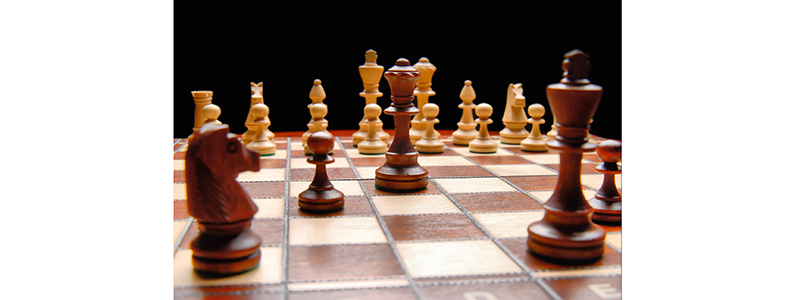
by Doug Goldstein CFP® | May 22, 2018 | Decision Making, Financial Plan |
While a financial loss can be devastating, it doesn’t mean that your situation can’t be improved. Sometimes, your loss can even, ironically, spur you on towards future success. Imagine that you lost an important piece, such as a bishop, or even your queen, in a game of chess. You wouldn’t just get up and walk away from the chessboard. You would look at the way your pieces are set up and try to see where you went wrong. Perhaps you need to change your strategy or rearrange your pieces so that you can strengthen your defense. Losing an important piece doesn’t always mean the end of the game. If you regroup, you may still have a chance of winning. In this case, your loss may lead you to become a better player. Setbacks can be a stepping stone to success Remember the proverb, “If at first you don’t succeed, try, try again.” Some of the most famous investors and entrepreneurs followed this advice, and even though they initially failed in their efforts, their determination eventually led to success. For example, Col. Harland Sanders failed at several businesses before, at age 40, he began selling fried chicken at a gas station in Kentucky. He didn’t give up on his efforts to succeed in the food industry. This enterprise eventually became Kentucky Fried Chicken, one of the most famous fast-food chains in the world. You can still turn things around Don’t consider a monetary loss to be the end of your financial world. Use it as a chance to reassess the way you manage your finances and a springboard to becoming... Click for more

by Doug Goldstein CFP® | Mar 27, 2018 | Financial Plan |
When you plan your finances, be realistic about what you want to achieve and how to go about attaining your goals. Just setting a goal doesn’t guarantee you’ll achieve it. From the outset, you need to be practical and understand the ramifications of your goal. Ask yourself: How achievable is the goal? Do I have the resources to get there? How do I intend to achieve my objective? What’s my plan? Don’t take your queen out too early Make sure not to approach your financial goals in the same way that a sloppy chess player plays a game of chess. When a chess player brings out his queen at the start of the game, before developing an effective strategy, it’s highly doubtful there will be a successful outcome. Chances are, he will lose his queen, the strongest piece, right at the beginning and end up defeated. Similarly, if you tackle your financial goals without a coherent plan or strategy, success will be elusive. Make sure you have backup One of the ways to play chess successfully is to make sure you have pieces to support your more active pieces in the frontline. In the same way, when building your financial plan, be aware that things may not go the way you intend. Markets can be volatile, and also life happens. Think of backup possibilities and be prepared to change your tactics if it becomes necessary. For example, make sure that you have an emergency fund in place to deal with unexpected crises rather than having to dip into your savings. Play like a professional When you create a financial... Click for more

by Doug Goldstein CFP® | Mar 13, 2018 | Decision Making, Financial Plan |
While you don’t want to be a reckless investor, over-zealous attempts at risk avoidance can cause you to lose money. Here’s why. Imagine that your friend invites you to play a game of chess. She is a good chess player, and there is a possibility that she will win. However, there is also a chance that you will win. But you decide that as you don’t want to take the risk of getting beaten, you won’t play at all. What do you gain from this decision to avoid risk altogether? Well, you definitely won’t lose the game. No one will beat you, and you won’t feel a sense of defeat. But you won’t win either. You certainly avoided a potentially uncomfortable position and replaced it with a neutral position – yet in doing so, you gave up the possibility of a pleasant position. How do you know for sure that you will lose? Wouldn’t it be better to at least try? The definition of failure Famous chess grandmaster Garry Kasparov once said: “I think our chances are not looking great today, but the only way to fail for me is just not to try.” His quote does not apply only to the world of chess, but also relates to investing. There is no such thing as an investment that is completely risk free, and some people find this idea extremely frightening. Their fear of losing money, known as “loss aversion,” is great enough to cause them to make poor investment decisions or not to invest their funds at all. Rather than putting their money into something that could potentially... Click for more

by Doug Goldstein CFP® | Feb 13, 2018 | Chess Strategies, Financial Plan |
What does the expression “active investor” mean to you? Does it make you think of someone who is constantly buying or selling investments, and moving his money around from one place to another in hopes of generating a profit? Here’s news: you can be an “active investor” even without actively buying/selling. Churning your portfolio will do you little good, and could actually create negative results. Simply buying or selling an asset in order to “do something” – as opposed to following your financial plan – is a serious financial mistake. Active investing means making sure to put your funds in the most productive places you can find… even parking them there for the long term. Active investing is making sure your money works for you. Active pieces on the chessboard Being an active investor is similar to being an active chess player. How is that? To take an analogy from the world of chess, consider the 1993 game when Susan Polgar played Vasily Smyslov. Here’s how Susan describes her win against him in Rich As A King: “When I played Smyslov in 1993 in Vienna, I placed my white bishop near the corner in square g2, where it stayed for 20 moves. Without constantly adjusting it, nor trying to find a new idea, I just left this well-placed bishop in an ideal spot. The volatility on the board certainly made me reconsider my strategy, but I knew that having a solid asset in the right square would, in the long run, help me to succeed. And when I finally deployed this powerful piece, I was able to chip away... Click for more

by Doug Goldstein CFP® | Jan 30, 2018 | Financial Plan |
Are you really paying attention to what you’re reading, or is it just the “illusion of attention?” Are you merely going through the motions, in effect sleepwalking all day long? Can not paying attention cause you to lose money? Imagine that you are playing a game of chess. You look intently at the board and see all the chess pieces laid out clearly in front of you. You’re absolutely sure you know what’s going to happen in the next move or two because it all looks so obvious. Then, out of nowhere, your opponent surprises you with an unexpected move. How could he surprise you if you were paying such close attention to the board? The reason for this is what psychologists refer to as the “illusion of attention.” It occurs when people believe that they see an entire scene, but they actually miss what’s right in front of their eyes. Cognitive psychologists Christopher Chabris and Daniel Simons wrote about the illusion of attention in The Invisible Gorilla. Many people suffer from this phenomenon, including experts and individuals in positions of responsibility. Among the examples that Chabris and Simons give in their book are an experienced airline pilot who did not see a plane on the runway where he was about to land, and a veteran nuclear submarine captain who could not see a 200-foot fishing boat that was right in the middle of his periscope view screen. Why do you miss important details? One of the main reasons why you don’t see important details, though they may be right in front of you, is because you simply don’t... Click for more

by Doug Goldstein CFP® | Jan 16, 2018 | Financial Plan |
Conservative investments, such as bank savings accounts or CDs (certificates of deposit in a bank), may not be as safe as you think. These types of accounts may actually produce negative real return rates over the years. Three main factors are responsible for negative return rates: Low interest rates Inflation Taxes Low interest rates Years ago, interest rates on bank savings accounts or CDs rates ranged from 3% – 6%. These days, interest rates are close to zero, generating almost no revenue. Low interest rates create a specific problem for retirees because when they originally invested their money, they expected to make a higher return rate than what they receive now. As a result, their savings may not have as much purchasing power as previously. Inflation Inflation erodes the value of your money while it sits in the bank. For example, what would happen if an investor put $100 into a bank savings account earning nearly no interest? That year, $100 is enough money to buy a leather jacket. But what if, when he retrieves the money the following year, inflation raised the jacket’s price to $105? In that case, the initial $100 is no longer enough to buy the jacket, so the $100 is worth less than the previous year. This change in money’s value is called “inflation.” Taxes Paying taxes is an ongoing expense, which lowers your net return. When interest rates are low, and inflation reduces the value of your money, taxes top it all off, resulting in negative return rates, even in so-called “safe investments.” How to profit with bond ladders when interest rates are... Click for more










